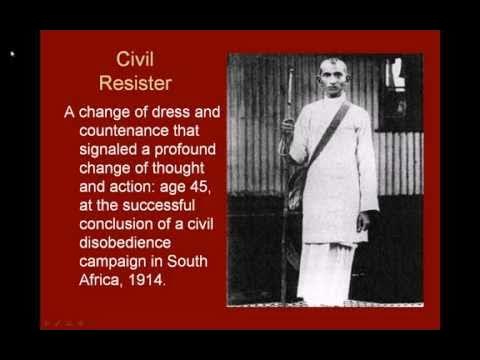Dennis Dalton - Gandhi's Journey and the Power of Nonviolence

Summary of "Dennis Dalton - Gandhi's Journey and the Power of Nonviolence"
Short Summary:
This webinar explores the life and philosophy of Mahatma Gandhi, focusing on his journey towards nonviolence and its power as a tool for social change. The presentation highlights Gandhi's personal transformation from a British-educated lawyer to a staunch advocate for Indian independence through nonviolent resistance. Key concepts like "satyagraha" (truth force) and the Salt March are discussed, demonstrating Gandhi's strategic brilliance in mobilizing mass movements. The webinar emphasizes the relevance of Gandhi's principles for contemporary social movements, particularly in the context of the Middle East and other regions facing oppression.
Detailed Summary:
1. Introduction:
- Dennis Dalton, a renowned scholar of Gandhi, introduces the webinar by framing Gandhi's life as a "pilgrimage to truth and freedom."
- He emphasizes the concept of "self-realization" as a central theme in Gandhi's philosophy, drawing parallels to ancient Hindu traditions and Western thinkers like Plato and Thoreau.
- Dalton highlights the importance of understanding Gandhi's personal journey, from his early life shaped by Hinduism to his later embrace of nonviolent resistance.
2. Gandhi's Journey:
- The presentation uses a series of photographs to illustrate the dramatic changes in Gandhi's appearance and self-identity throughout his life.
- Dalton analyzes Gandhi's childhood, highlighting the influence of his family's Orthodox Hinduism and his mother's emphasis on ahimsa (nonviolence).
- He then discusses Gandhi's emulative phase, where he was deeply influenced by British culture and aspired to become an English gentleman.
- The turning point in Gandhi's journey is attributed to his experiences with racial discrimination in South Africa, which led him to reject Western civilization and embrace satyagraha.
3. The Power of Nonviolence:
- Dalton introduces the concept of satyagraha, a term coined by Gandhi, which literally means "adhering firmly to the forces of truth and love."
- He emphasizes that satyagraha is not simply about mass strikes but about a profound transformation of the spirit, purging violence and hatred.
- Dalton highlights the importance of courage, commitment, and strategic organization in making satyagraha effective.
4. Gandhi as a National Leader:
- The presentation discusses the Amritsar Massacre of 1919, a pivotal event that solidified Gandhi's commitment to nonviolent resistance.
- Dalton analyzes Gandhi's response to the massacre, highlighting his rejection of violence and his call for forgiveness and non-cooperation with the British Raj.
- He emphasizes the symbolic significance of Gandhi's simple clothing, which identified him with the poverty of the masses and his role as a holy man.
5. The Salt March:
- The Salt March of 1930 is presented as a prime example of Gandhi's strategic brilliance in mobilizing mass movements through civil disobedience.
- Dalton explains the symbolic and economic significance of the salt tax, which disproportionately affected the poor peasantry.
- He highlights the careful planning and execution of the Salt March, including Gandhi's letter to Lord Irwin, the selection of marchers, and the use of media to amplify the movement's message.
6. The Success of Nonviolence:
- Dalton attributes the success of the Salt March to several factors, including the large number of participants, the ambivalence of the British authorities, and Gandhi's strategic use of humor and symbolism.
- He emphasizes the importance of understanding Gandhi's principles of nonviolence as a means of achieving social change, not just as a passive form of resistance.
7. Gandhi's Legacy:
- The presentation concludes with a quote from Gandhi's last testament, emphasizing his commitment to empowering the poor and marginalized.
- Dalton discusses the relevance of Gandhi's principles for contemporary social movements, particularly in the context of the Middle East and other regions facing oppression.
- He highlights the influence of Gandhi on Martin Luther King Jr. and other leaders of the Civil Rights movement, emphasizing the enduring power of nonviolence as a tool for social transformation.
8. Q&A Session:
- The webinar includes a Q&A session with participants, addressing questions about the application of Gandhi's principles in various contexts, including Pakistan, Israel/Palestine, and Nepal.
- Dalton offers insights on how to effectively utilize nonviolent resistance in different situations, emphasizing the importance of organization, strategic planning, and a commitment to truth and love.
9. Closing Remarks:
- The webinar concludes with a quote from Martin Luther King Jr., highlighting the enduring relevance of Gandhi's message of hope and social transformation through nonviolence.
- Dalton emphasizes the importance of continuing to strive for a world of peace and harmony, inspired by Gandhi's legacy.